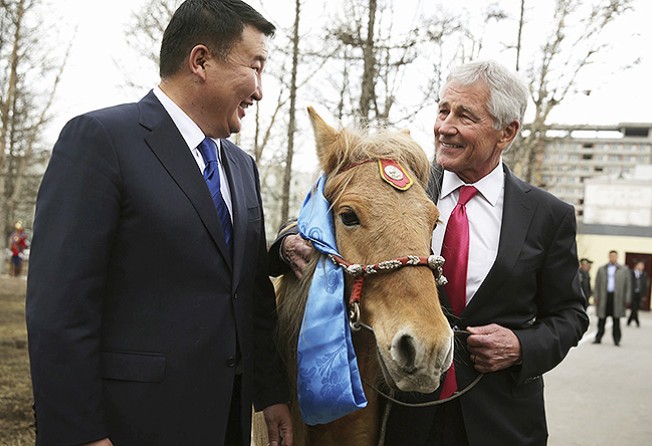US Defence Secretary Chuck Hagel boosts Mongolia ties as Asia trip ends
US defence secretary signs an agreement with his Mongolian counterpart for expanded military training and exercises but bases are ruled out

After days of high-profile, pressure-filled meetings, US Defence Secretary Chuck Hagel got to horse around a bit during a short stop in Mongolia yesterday.
Following a time-honoured tradition, Mongolian Defence Minister Bat-Erdene Dashdemberel presented Hagel with a buckskin-coloured horse in a ceremony in front of the country's defence ministry. Hagel, who was wrapping up a 10-day trip to the Asia-Pacific region, named the horse Shamrock.
Tradition dictates the nine-year-old gelding be named after something of importance to the recipient, Hagel said. "Shamrock was the mascot of the high school that I graduated from, St Bonaventure in Columbus, Nebraska," he said. "It was one of the most important times of my life."
Shamrock will stay in Mongolia, where he has been serving in the cavalry's honour guard battalion. No one would ever ride the horse but Hagel, officials said.
"Now you be good while I'm gone," Hagel said as he patted the stocky horse.
Hagel is the second defence secretary in recent years to receive one of the Mongolian horses, which are bred for endurance. Then-Pentagon chief Donald Rumsfeld got one when he visited in October 2005.
The gift to Hagel reflected the congenial tone of the day, as the secretary and Bat-Erdene signed an agreement that calls for expanding US military training and exercises with Mongolia. The agreement signed by Hagel noted that Mongolia "serves as a stabilising influence in Asia and is seeking to modernise its military in a transparent fashion".
"A strong US-Mongolia defence relationship is important as part of the American rebalance to the Asia-Pacific region," Hagel said, referring to the strategic "pivot" that China has eyed with concern.
But Bat-Erdene ruled out the possibility of hosting US bases, which currently exist in Japan and South Korea.
"We have a law not to establish foreign military bases or to station troops in our country," he said.
Landlocked with 2.8 million people, Mongolia is dwarfed by China, but also relies on the Asian nation for much of its economy. It has worked to maintain its independence from Beijing and Moscow by increasing its ties to other world powers, including the US and Japan.
Mongolian troops have been a visible and frequent force in Iraq and Afghanistan, often providing security at US facilities. There are about 10,000 active duty Mongolian troops, and to date 9,500 have served in Iraq, Afghanistan or another peacekeeping mission around the world.
All the commanders who led Mongolian troops during the Iraq and Afghanistan deployments went through US training programmes, the Pentagon said.
The Mongolia stop was brief and friendly as the two defence chiefs talked about how they wanted to improve Mongolia's peacekeeping efforts and its military's medical services. Hagel's meetings in China, however, were often sharper and tinged with controversy.
The US has criticised Beijing's recent declaration of an air defence zone over a large swathe of the East China Sea, including disputed remote islands controlled by Japan but claimed by China.
Hagel and the Chinese leaders have had sharp exchanges on those issues, as well as Washington's continued close ties with Taiwan, at meetings and public events.
Beijing leaders have asserted their right to protect and regain their territories using diplomacy and military action if necessary. They have questioned US claims that it remains neutral on the sovereignty of the disputed islands. The US has said it will protect Japan, its ally by treaty.
Additional reporting by Agence France-Presse